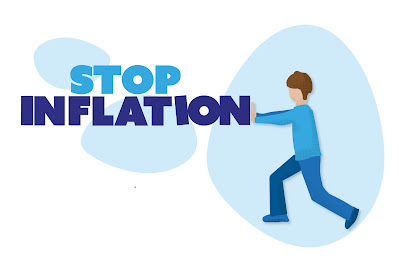 |
| Inflation &Life |
Inflation is the rate at which prices change. Inflationary pressures suggest that you'll have to pay more for the same goods and services. If you possess assets before prices rise, such as homes or stocks, this can help you, but if your income doesn't keep up with inflation, your purchasing power diminishes. Inflation raises your cost of living over time. Inflation can be harmful to the economy if it is high enough.
The impact varies according to the type of inflation. Walking inflation, for example, is from 3% to 10% per year. Running inflation signifies a more aggressive rise in prices, which could be a forerunner to hyperinflation. Creeping inflation is milder than walking inflation.
Price increases could be a sign of a fast-growing economy. Demand for products and services is fueled by people buying more than they need to avoid tomorrow's rising prices. Suppliers are unable to keep up. Worse then, neither can wages. As a result, most people are unable to afford common products and services.
Inflation of Assets
Inflation has different effects on different things. For example, gas expenses may double while the value of your home decreases. That's exactly what happened during the 2008 financial crisis. Home values have dropped nearly 20% in the last year. In the meantime, oil costs have risen. In July 2008, they hit an all-time high of $128 per barrel. Because oil prices have an impact on petrol costs, the price of a gallon of gas has risen past four dollars in several parts of the United States. At a time when many people were concerned about losing their employment, driving to work became even more expensive and unpleasant.
In other places of the country, gas prices soared to comparable levels, breaking the $4-per-gallon record in October 2021. The consumer price index in the United States increased to 6.2 percent, its highest level since November 1990, as the economy recovered from the pandemic-related downturn.
When Is Inflation Beneficial to the Economy?
Inflation can be beneficial to the economy at times. Inflation has a beneficial side effect when it is modest. People who anticipate inflation are more likely to spend now rather than later since they know prices will rise in the future. Consumer spending is the engine that propels the economy forward.
The Central Bank does, in fact, set an inflation target. It aims for a healthy core inflation rate of 2%, which excludes the impact of food and energy costs. The central bank prefers a small amount of inflation, which makes customers feel prices will continue to rise.
Erodes Purchasing Power
This initial effect of inflation is merely another way of expressing the same thing. Inflation is the loss of a currency's buying power due to an increase in prices throughout the economy.
For example, if the price of product A increases, this could be due to a boost in product A's demand, price pooling by a cartel of product A producers, or years of terrible drought, flooding, or conflict in a key Product A-growing region. Product A's price would rise in those circumstances, but the rest of the economy would be mostly unaffected. Only product A users see significant depreciation in their entire purchasing power, hence that scenario does not qualify as inflation'
Inflation demands that prices grow across a "basket" of products and services, such as the consumer price index, which is the most commonly used measure of price fluctuations (CPI). When non-discretionary and impossible-to-substitute products, such as food and gasoline, rise in price, they can cause inflation on their own. As a result, economists frequently exclude food and fuel from their calculations in order to examine "core" inflation, a less volatile measure of price movements.
Implications for Retirement Planning
Inflation might have a negative impact on your retirement plans. To maintain the same standard of living, your target amount must continue to rise. In other words, as time passes, your money will purchase less.
Save more than you think you'll need to account for inflation during your retirement. It's also critical to start saving as soon as possible to maximise the benefits of compounding interest.
Treasury Bonds are affected.
If you own bonds or Treasury notes, keeping an eye on inflation is critical. Each year, these fixed-income assets pay the same amount. When inflation outpaces the rate of return on these assets, they lose value. People hurry to sell them, lowering their value even more. When this happens, the US government is compelled to sell Treasury bonds at higher yields in order to sell them at all. As a result, the majority of mortgage interest rates have risen.
Higher interest rates reduce the value of your assets. They also raise the cost of financing the US debt for the federal government. The national debt's interest rate is increasing. The higher budget expense must be offset by a reduction in discretionary spending or a tax increase. Otherwise, there will be more deficit spending. All of these policies are contractionary fiscal policies that hinder economic development and degrade living standards.
When Inflation Turns Into A Catastrophe
Hyperinflation is defined as monthly inflation exceeding 50%. It happens when the government produces money without regard for the pace of inflation. It happened in the 1920s in Germany (with the highest monthly inflation rate of 29,525.71%) and in the 2000s in Zimbabwe (last recorded monthly inflation rate of 2,600.2 percent in 2008). Hyperinflation could bring the United States' economy to a halt.







0 Comments